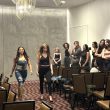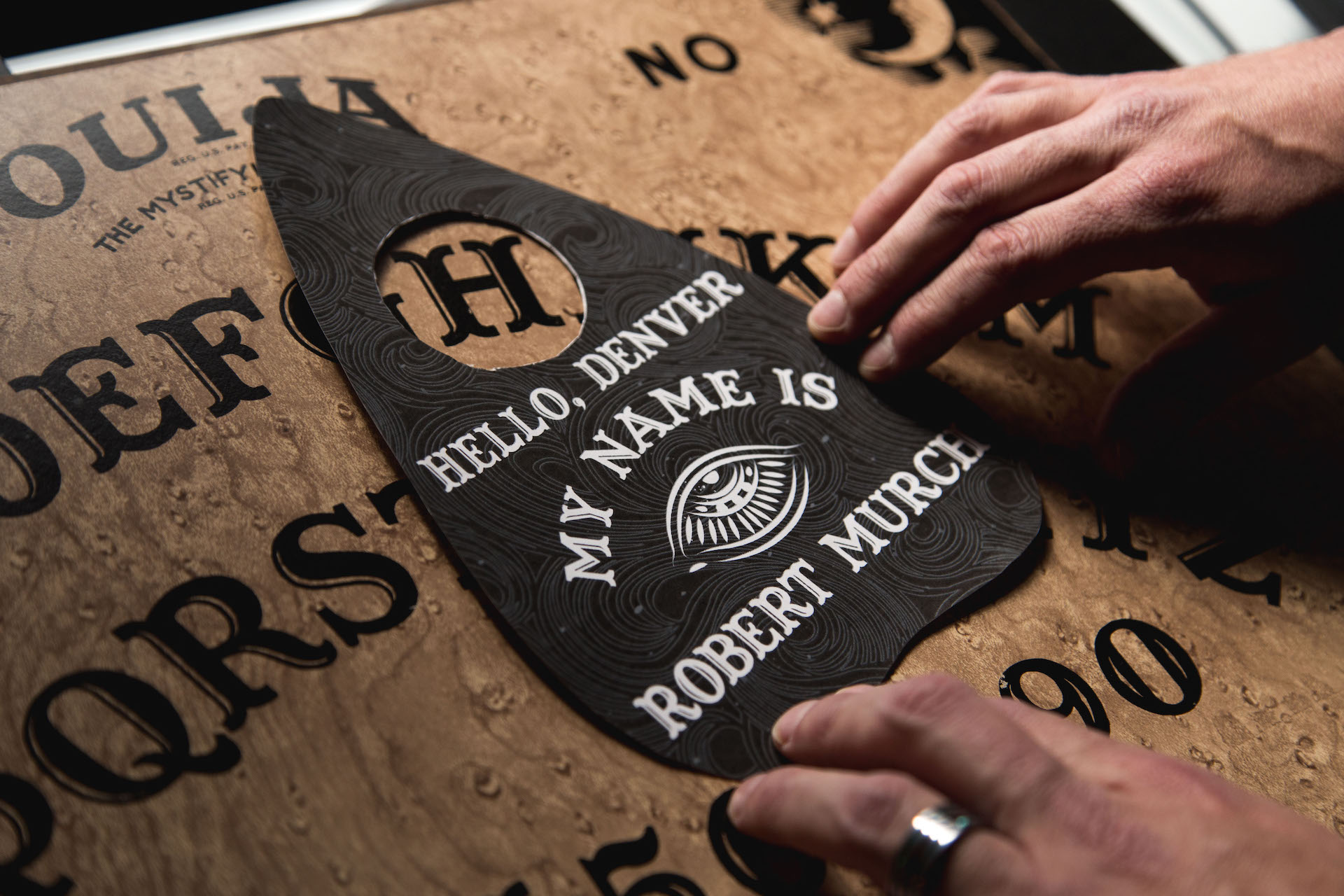Welcome to our series, Hello Denver, My Name is… where we profile different people in Denver you probably don’t know, but should. Get ready to meet painters, dancers, comedians, musicians, designers and just generally fascinating people that help make Denver awesome.
It seems like everyone has an Ouija board story. Whether you found it at a yard sale, dug it out of the basement, played at a sleepover or just heard someone else’s story, you’ve no doubt had some kind of encounter with the iconic game. If you’ve ever dug deeper and questioned the origins of this mysterious board, then you have far more in common with Robert Murch than you’d think. Hollywood’s resident Ouija expert, Murch has an extensive collection of talking boards in his basement – part of a minor interest that has slowly taken over Murch’s life.
Since he embarked on his search for the true story behind the Ouija board, Murch has developed meaningful relationships with the grandchildren of the inventors of Ouija – who have served as an incredible primary resource for Murch’s historical inquiry into talking boards, along with records kept in various archives throughout the country. He also founded an organization devoted to talking boards and made a name for himself as the world’s foremost expert and historian on the subject and consulted on a number of movies and TV shows. He’s even unearthed a bit of Ouija history with direct ties to Denver. After devoting most of his life to exploring the mysteries of Ouija, it should come as no surprise that Murch can recite the board’s history from memory. While he may have answered more questions than anyone else has ever thought to ask, Murch is still on the hunt for more interesting bits of Ouija history – and he has no doubts that Ouija will reveal all of its secrets when the time is right.
Denver, meet Robert Murch
303 Magazine: I know you’re originally from the East coast. How did you end up in Denver?
Robert Murch: What happened was, about three and a half years ago, my husband got an offer to move from Boston. They wanted him to work and start up the offices out here. I used to come out here all the time, you know to speak about the Ouija board in Estes Park anytime there was a paranormal thing up here. So, he had never been out here and they paid for us to come out here for a week. He fell in love with it and we decided to do it, and very shortly after they got everything together and here we are.
303: I know you played a part in uncovering some of Denver’s very own Ouija history. Can you tell me about that?
RM: It was 2012 [or] 2013 when we discovered and were able to prove that a woman was involved in the inception of the Ouija board. Just to be clear for the people who will read this, the Ouija board is a talking board. Talking boards are the class that all of these are – anything that you put your hands on and ask a question to, something points out letters, numbers [or] words is a talking board.
In 1890, [one of the inventors of the Ouija board] Charles Kennard moves to Baltimore where he meets Elijah Bond. Elijah Bond is a lawyer, but Elijah Bond sees something. He cleans up the board, puts it into that iconic arc – that iconic double [letter] arc, [with] yes, no, [it’s] very simple – and they start making it. But it still doesn’t have a name or a story to it. One night, they’re in the rooms of Elijah Bond and his family in Baltimore, and there’s Charles Kennard, Elijah Bond, Helen Peters – Helen Peters is Elijah Bond’s sister-in-law, and they consider her a great medium. So, with Charles Kennard at the board along with Helen Peters and Elijah Bond who is there with his wife and his child, they decide to ask the board what it wants to be called. According to those present, the board answers “O-U-I-J-A.” They ask what that means, and it answers “good luck.” So, Ouija the Egyptian luck board was born – they believed that Ouija was Egyptian for good luck.
Elijah Bond files for a patent on this. So, Helen Peters and Elijah Bond actually go to the patent office to prove [the board works]. So, what happens is they start to demonstrate it to each patent officer and each patent officer is like “okay cool, but I don’t really want to be the one to certify this because then I’ll be the laughing stock of the patent office.” So, they go through [everyone] and eventually there’s no one left. So, the chief clerk of the patent office, whose main job really is to oversee everyone, is pretty annoyed that this wasn’t taken care of and it’s gotten all the way to him. He goes into the room, throws open the door and tells them “look, you don’t know me and I don’t know you. If that contraption can spell out my name you’ve got your patent.” And, with Helen Peters at the board it spells out his name letter by letter. So, a very visibly shaken, pale-faced patent officer says “fine, you’ve got your patent,” and leaves the room very quickly. Sure enough the patent was given.
303: What is Helen Peters’ connection to Denver?
RM: Helen would leave the company very early, and then move with her husband out here to Denver, where she lived for 43 years. She was 40 years old when she got married, she was a cougar and she married a much younger guy. They stayed married and according to the families and everything I’ve ever heard, they were deeply in love with each other their whole lives. They were the love of each other’s lives. It was really cool. But the Ouija board caused a feud in her family. That’s what caused her to leave the Ouija board. She was the mother of the Ouija board and she abandons her child. The Ouija board tells her family something they don’t like, and something she doesn’t like.
She never goes back to Baltimore. Elijah Bond and his wife, Helen’s sister, are actually buried in the Peters’ family plot where she would have been buried but she never goes back. She’s buried here in Fairmont cemetery with her friends because she just didn’t want to go back after that. So, she would leave the Ouija board and she would tell everyone to never play the Ouija board because it lies, and she would say that until the day she died.
303: Oh wow.
RM: When I first tell this story, the first thing people think is that she’s a woman so of course she got written out. But no, that’s not what happened. She’s written out of Ouija board history because she left the company and wasn’t supporting it anymore. So, Denver has one of the most unique pieces of Ouija board history. Which is the final resting place of the woman who – without her the Ouija board wouldn’t have its name and never would have been patented, and therefore we wouldn’t be talking about it today.
303: How did your fascination with Ouija begin?
RM: In 1986 a very small movie called Witchboard came out. My grandmother, who was very into this stuff – I was raised Orthodox Jew, obviously not practicing now – she loved sci-fi and horror. She snuck me into the movies, and I saw it. It fascinated me that the main character of this movie was not a person. The main character was the board. The fact that people were so afraid of it – it was like cardboard and plastic and yet it struck terrifying fear in the hearts of people. That really stuck with me. I was 13 then, and from there I reached out to Kevin Tenny, the writer and director, and we became friends – over time I would write to him, back then it was like pen pals, no internet. That friendship would turn into email, and then Facebook and stuff.
303: How did you go from your interest being piqued by a movie to now being the foremost collector and historian of Ouija boards?
RM: In college, I was in a quad – so I had three roommates. They wanted to rush for a fraternity. I knew that if I rushed for a fraternity then I would never graduate, so it wasn’t a good idea for me. But great to have friends in a fraternity, because then you can go party and then leave. So, part of their rushing for fraternity was they had to treasure hunt. They had to find all these things, and one of the things on the list was a Ouija board. I’m from New England, and what New Englanders do on the weekends are antique, flea market, yard sale – that’s just what you do. So, I knew that I had seen them and I said I’d just go home on the weekend and I’ll just pick up a bunch for you guys. When they gave them back after they were done I had 10, and they were all different. I didn’t pay attention when I was picking them up, but I was looking at them and thought “huh, weird.” But there was only one Ouija board. So, I went to the library and every Encyclopedia said that the Ouija board came from someplace else. None of them agreed. So, I thought how can it be that everyone I talk to knows what the Ouija board is, everyone’s got a story whether it’s theirs or someone else’s and yet we don’t know where it comes from. So, that set me off on a 27-year journey now, as to finding out the real story of the Ouija board
303: Can you talk to me about The Talking Board Historical Society?
RM: The Talking Board Historical Society started – if we look back, at the time we didn’t know this – when I found Elijah Bond’s grave, the man who patents the Ouija board, and were able to put in [a headstone]. At first, I was just going to put the stone in myself. I was talking to my husband and I thought, you know it feels like it would be cooler if we got some of the other collectors to work together. Collectors don’t usually work together. They all want the same thing, so they can be really – like putting a bunch of snakes in a pit. So, that was the first real attempt to see if we could work together, was it going to be worth it or should I just have done it myself. So, we do it. We raise the money with all the other collectors and people and we put in that stone. And that’s the first time everyone works together to do something bigger than themselves and bigger than their collections.
In 2014, we become the Talking Board Historical Society. I think it was founded in 2013, but we actually incorporate in 2014. We’re a registered nonprofit. We go around the country and the world, celebrating the talking board and Ouija history. We put in plaques in buildings, we dedicate things and help them to be made historic monuments or landmarks and we put in gravestones and things. It’s really fun.
303: What is your role with that organization?
RM: I was named the president and chairman of the board. So, I’m the chairman of the board and that’s a lifetime appointment. The president will hopefully change. Hopefully, someone will step up and take over.
303: You were involved with the movie Ouija. What was your role with that film?
RM: Doing the Ouija movie was a huge – probably the highlight for me. What happened was, I think [my husband] and I came home from one of his work parties – it was late at night, one or two o’ clock in the morning. I was watching MTV and it was Brian Goldner – who is the president of Hasbro – talking about how he wanted to expand the brand. One of the brands he was talking about that he really wanted to do a movie about was Ouija. He just felt it was very unexplored. There was so much there, everyone knows about it, he doesn’t have to do any advertisements, it’s just brilliant. He really wanted to explore it. So, I really wanted to be a part of that. I think that was in 2009. The Ouija movie doesn’t come out until 2014, so there was a lot going on before we make it to even filming. So, I really quickly hop on the computer and figure out that there are three possibilities for his email. So I write one email and send it to three possibilities for his email. Two kick back and one went through. So I’m like cool, one of them got to him, but he’s never going to write me back. He’s the president of Hasbro, why would he write me back? No sooner do I get into bed, my phone goes off. He writes back and he says “Hey, Murch, we know who you are, you’re the Ouija guy. We’d love to have you on this project.” So he puts me in touch with LA people who are working on these movies and we work on it. We talk for quite a few years about what is special about the Ouija board and how do we capture that, how do people use the Ouija board.
303: Our last question is from our previous interviewee, Lawrence Rivera: “Would you rather be completely forgotten or hatefully remembered?”
RM: I’d have to say completely forgotten. As a Ouijastorian, that may sound crazy as I’ve dedicated my life to preserving Ouija’s history. But, there is way too much hate in the world right now and I wouldn’t want to add one more ounce of hate in anyone’s heart. If being forgotten accomplishes that, then I’d gratefully disappear.
Editor’s Note: The interview has been edited and condensed for clarity.





